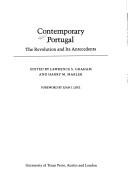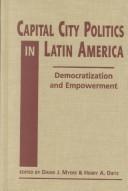| Listing 1 - 10 of 10 |
Sort by
|
Book
ISBN: 1000304868 1000232980 0429313993 9780429313998 9781000304862 9781000268928 1000268926 9781000232981 9780367295240 9780367310707 Year: 2019 Publisher: New York, NY
Abstract | Keywords | Export | Availability | Bookmark
 Loading...
Loading...Choose an application
- Reference Manager
- EndNote
- RefWorks (Direct export to RefWorks)
Lawrence S. Graham focuses on the implications of the Portuguese case for understanding more fully broader, cross-national patterns in politics and governance, showing how the Portuguese case may constitute an alternative model especially for Latin America and Eastern Europe.
Civil-military relations --- Portugal --- Politics and government
Book
ISBN: 9781477304181 Year: 2021 Publisher: Austin
Abstract | Keywords | Export | Availability | Bookmark
 Loading...
Loading...Choose an application
- Reference Manager
- EndNote
- RefWorks (Direct export to RefWorks)
Book
ISBN: 0292765207 Year: 1990 Publisher: Austin (Tex.) : University of Texas press,
Abstract | Keywords | Export | Availability | Bookmark
 Loading...
Loading...Choose an application
- Reference Manager
- EndNote
- RefWorks (Direct export to RefWorks)
Book
ISBN: 0822302926 Year: 1973 Publisher: Durham (N.C.) : Duke university press,
Abstract | Keywords | Export | Availability | Bookmark
 Loading...
Loading...Choose an application
- Reference Manager
- EndNote
- RefWorks (Direct export to RefWorks)
Bureaucracy --- Public administration --- Public administration. --- Study and teaching
Book
ISBN: 0813371600 Year: 1987 Publisher: Boulder (Colorado) Westview Press
Abstract | Keywords | Export | Availability | Bookmark
 Loading...
Loading...Choose an application
- Reference Manager
- EndNote
- RefWorks (Direct export to RefWorks)

ISBN: 0292773048 9780292773059 0292773056 9780292773042 029271047X 9780292710474 0292710488 9780292710481 Year: 1979 Publisher: Austin University of Texas Press
Abstract | Keywords | Export | Availability | Bookmark
 Loading...
Loading...Choose an application
- Reference Manager
- EndNote
- RefWorks (Direct export to RefWorks)
Despite worldwide interest in the Portuguese Revolution of 1974, Portugal remained for most people a little known and poorly understood country, neglected for years by social scientists. Editors Graham and Makler brought together for the first time in one substantive volume most of the leading social science experts on Portugal. The contributors' highly original research represents the best work generated by the International Conference Group on Modern Portugal at its two major conferences held in 1973 and 1976. The result is a comprehensive collection of essays discussing in detail the events leading up to the revolution, the causes of the military coup, and the movement of a society on the brink of revolutionary upheaval toward open, democratic parliamentary elections. As the first interdisciplinary study to span fifty years of Portuguese history from the Estado Novo of 1926 to the eventual social democratic republic, this book stands alone in its field. The specialist as well as the general reader will find insights into the dynamics of Portugal's people, politics, and economics.
Portugal --- Politics and government --- History
Article
Abstract | Keywords | Export | Availability | Bookmark
 Loading...
Loading...Choose an application
- Reference Manager
- EndNote
- RefWorks (Direct export to RefWorks)
Book
Year: 1979 Publisher: Austin-London University of Texas Press
Abstract | Keywords | Export | Availability | Bookmark
 Loading...
Loading...Choose an application
- Reference Manager
- EndNote
- RefWorks (Direct export to RefWorks)


ISBN: 1626371288 9781626371286 1588260402 9781588260406 Year: 2022 Publisher: Boulder
Abstract | Keywords | Export | Availability | Bookmark
 Loading...
Loading...Choose an application
- Reference Manager
- EndNote
- RefWorks (Direct export to RefWorks)
As Latin America's new democratic regimes have decentralized, the region's capital cities--and their elected mayors--have gained increasing importance. Capital City Politics in Latin America tells the story of these cities: how they are changing operationally, how the the empowerment of mayors and other municipal institutions is exacerbating political tensions between local executives and regional and national entities, and how the cities' growing significance affects traditional political patterns throughout society. The authors weave a tapestry that illustrates the impact of local, national, and transnational power relations on the strategies available to Latin America's capital city mayors as they seek to transform their greater influence into desired actions.
Municipal government --- Capitals (Cities) --- Community power --- Democracy --- Community organization --- Elite (Social sciences) --- Local government --- Power (Social sciences) --- Sociology, Urban --- Capital cities --- Cities and towns --- Administration municipale --- Capitales --- Pouvoir communautaire --- Démocratie
Book

ISBN: 9780292773042 Year: 2021 Publisher: Austin
Abstract | Keywords | Export | Availability | Bookmark
 Loading...
Loading...Choose an application
- Reference Manager
- EndNote
- RefWorks (Direct export to RefWorks)
| Listing 1 - 10 of 10 |
Sort by
|

 Search
Search Feedback
Feedback About UniCat
About UniCat  Help
Help News
News